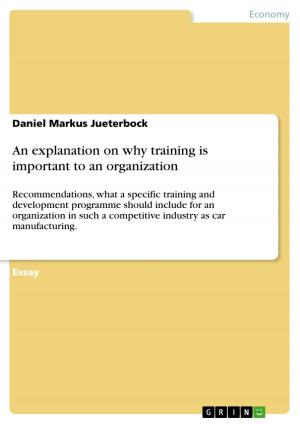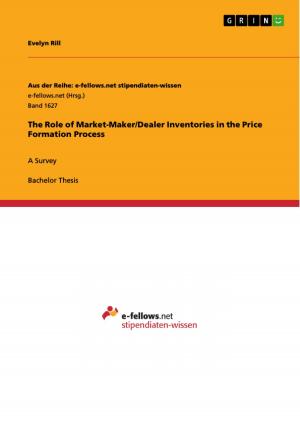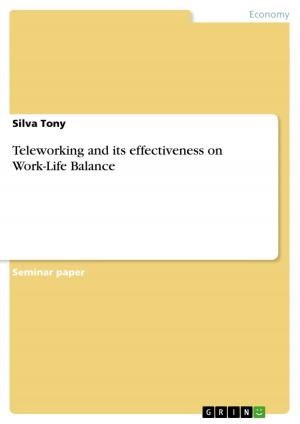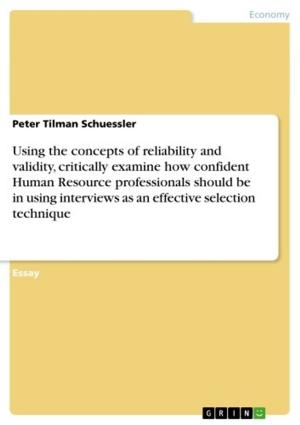Work life balance - any improve for business?
any improve for business?
Business & Finance, Human Resources & Personnel Management| Author: | Fatma Torun | ISBN: | 9783638329491 |
| Publisher: | GRIN Publishing | Publication: | December 2, 2004 |
| Imprint: | GRIN Publishing | Language: | English |
| Author: | Fatma Torun |
| ISBN: | 9783638329491 |
| Publisher: | GRIN Publishing |
| Publication: | December 2, 2004 |
| Imprint: | GRIN Publishing |
| Language: | English |
Essay from the year 2004 in the subject Business economics - Personnel and Organisation, grade: Good, University of East London, 14 entries in the bibliography, language: English, abstract: The role of work and the workplace have changed throughout the world due to economic conditions and social demands. Global competition, renewed interest in personal lives and family values and an ageing workforce are factors which contribute to the serious consideration of equilibrium between work and life (Lockwood, 2003). The challenge of work-life balance is rising to the top of many employees' and employers' consciousness. Employees are placing more value on quality of working life and seeking for greater flexibility so that they can manage work commitments along personal life. Employers, on the contrary, need in today's economic climate a workforce that is stable and committed but also more adaptable and flexible to meet business challenges. Finding the right balance between work responsibilities and the demands on personal lives is conclusively becoming a significant issue (Loghran, 2002). Therefore, at the core of human resource strategy lays the need to consider work-life balance for employees. One of the vehicles to help provide attainment of personal and professional goals are work-life programmes. But why should organisations follow this work-life trend? Is it a critical business issue or simply the 'right thing to do'? Which potential business improvement does work-life programmes offer to organisations? The aim of this report is to analyse the benefits for employers when implementing work-life balance programmes. Therefore, the concept of work-life balance will be defined and the potential business benefits will be analysed. Based on this analysis, this report will show that organisations can gain a competitive advantage when offering work-life initiatives.
Essay from the year 2004 in the subject Business economics - Personnel and Organisation, grade: Good, University of East London, 14 entries in the bibliography, language: English, abstract: The role of work and the workplace have changed throughout the world due to economic conditions and social demands. Global competition, renewed interest in personal lives and family values and an ageing workforce are factors which contribute to the serious consideration of equilibrium between work and life (Lockwood, 2003). The challenge of work-life balance is rising to the top of many employees' and employers' consciousness. Employees are placing more value on quality of working life and seeking for greater flexibility so that they can manage work commitments along personal life. Employers, on the contrary, need in today's economic climate a workforce that is stable and committed but also more adaptable and flexible to meet business challenges. Finding the right balance between work responsibilities and the demands on personal lives is conclusively becoming a significant issue (Loghran, 2002). Therefore, at the core of human resource strategy lays the need to consider work-life balance for employees. One of the vehicles to help provide attainment of personal and professional goals are work-life programmes. But why should organisations follow this work-life trend? Is it a critical business issue or simply the 'right thing to do'? Which potential business improvement does work-life programmes offer to organisations? The aim of this report is to analyse the benefits for employers when implementing work-life balance programmes. Therefore, the concept of work-life balance will be defined and the potential business benefits will be analysed. Based on this analysis, this report will show that organisations can gain a competitive advantage when offering work-life initiatives.















